The High Key Portrait Series: Hardwork Movement

Hardwork Movement | photo by Josh Pelta-Heller for WXPN
“High Key” is a series of profiles conceived with the intent to tell the story of Philly’s diverse musical legacy by spotlighting individual artists in portrait photography, as well as with an interview focusing on the artist’s experience living, creating, and performing in this city. “High Key” will be featured in biweekly installments, as the series seeks to spotlight artists both individually and within the context of his or her respective group or artistic collective.
Philly’s newest live-hip-hop collective is working this Spring on perhaps their most ambitious project to date. Historically, where Hardwork Movement’s live shows boast a full band with woodwinds and brass, their albums feature produced beats. But as MC Sterling Duns explains, for the first time, the crew has recently brought their whole band into the studio, determined to document the energy and sound of their shows with their first live recording. As Duns puts it, they wanted to “capture that, bottle that up, so people can take that home with them.”
Packaging the magic of being there into any medium can be challenging, especially when it comes to a crew like this one. The biggest thing about Duns, Jeremy Keys, RB Ricks and Rick Banks — the thing that comes across so immediately and infectiously in person (and, it’s pertinent to note here, what any written interview might also stand to lose, in translation) is their chemistry, the personality of each of the four of them as individuals that informs the rapport and the charm of the group as a whole as well. These longtime friends share history, and the love for music and for their hometown that serves organically to shape their shows, their compositions, their productions and performances, all styled with a wide and eclectic range of artistic influences.
They’ll play World Cafe Live Tuesday night for NPR Music’s sold-out Tiny Desk Philly concert. Later in the month, they’ll return to one of their favorite venues, Johnny Brenda’s, and for the first time will be featured at Firefly Festival in Dover this Summer, among other appearances this year. And in the meantime, they’re working toward a new album, and toward their commitments to supporting and mentoring the students of Play On Philly’s youth orchestra program too.
The Key: What part of Philly are you guys from?
RB RICKS: So I grew up in the Olney section of Philadelphia. Not too far from Olney High School, right by 5th and Olney, 5th and Duncannon.
TK: Did you go to Olney High?
RB RICKS: I did not, I went to Friends Central, that’s how I met up with Sterling and Rick Banks over here. I went to middle school in the Kensington area, I went to Conwell, magnet school.
TK: Where are the rest of you guys from?
JEREMY KEYS: I’m from Downingtown.
STERLING DUNS & RICK BANKS: Overbrook. West Philly.
TK: What do you guys remember from high school, what first comes to mind?
RICK BANKS: Meeting RB and Sterling. Met them in cross-country practice — I was a senior when they were freshmen. The beginning of our relationship was largely through sports. All three seasons that year actually, we played together. So, just getting to know them, getting to watch them develop. I was a captain for two of those seasons, and then I came back and coached too, so it’s been really cool to watch that relationship change, really getting to know them.
STERLING DUNS: Pre-season sports. I showed up at Friends Central thinking I would play soccer — I wasn’t even planning to run cross-country, which is where I met Banks — and I was headed to the soccer field. And I had met RB at an orientation event the January before, so when I first got to school I was like, ‘yo, whatchu doin’?’ and he was like, ‘I’ma try out this cross-country thing,’ so I was like, ‘ok, I’ma try that as well!’ Worst. Sports. Day. Of. My. Life. We ran, Keenan [Banks] was captain then, and I literally almost passed out, I had on my basketball shoes, I had on the craziest uniform! I looked like I was about to hoop, runnin’ three miles around Wynnewood. But that was one of my earliest memories of high school, was pre-season sports, meeting RB and Banks. [laughs]
RB RICKS: Same thing, kinda ditto-ing that, I remember that, that was literally the first day I was officially a Friends Central student, and the first day as a high-schooler. That was a big moment. And then just kinda meeting Banks, Duns, and meeting pretty much everyone else at the school. Another big time for me was probably the the first time I was on stage, too. Our basketball coach made us do this Black-History Month presentation, we stood with our back to the audience, and like we turned around and only did like two lines of this poem, it was like the Boppin’ Brothers, I mean it was very simple, it was like “be-bop, bop. What about the brothers?” I think that was the only line, but I turned around and I was terrified! I just remember, you know, my back was towards the audience and I turned around and I just remember seeing you know all two-hundred people that went to the school, and I was like oh shoot… You know, I think that was another big moment for me, just the few pieces that I remember, on stage with some of the basketball team there, that was pretty fun.
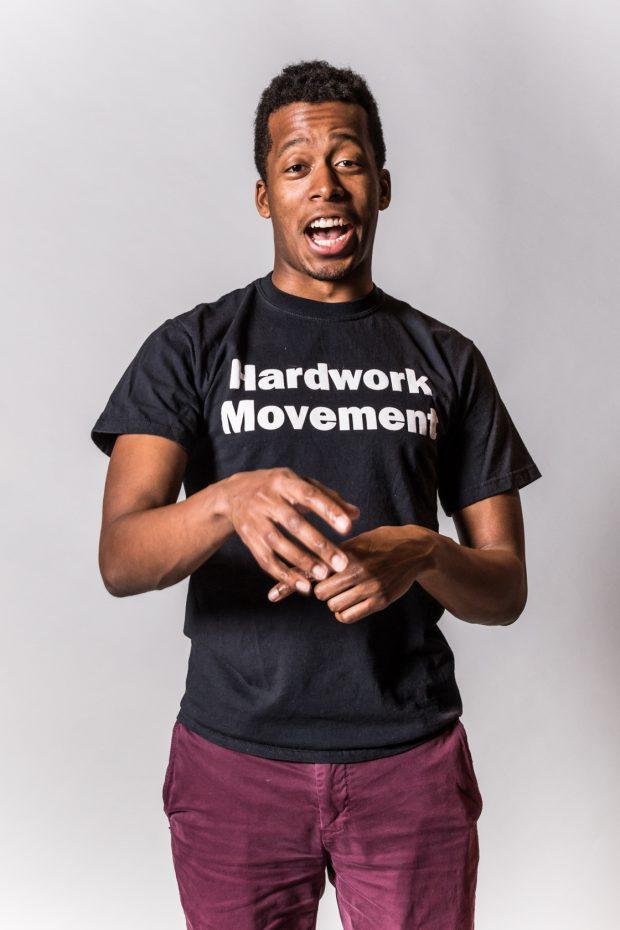
Hardwork Movement | photo by Josh Pelta-Heller for WXPN
STERLING DUNS & RICK BANKS: Be-bop BOP, what about the brothers?!
RB RICKS: Yeah, that was it!
TK: What about you Keys?
JEREMY KEYS: High school?! Oh, man! I also ran track, and cross-country, and we used to always talk about how there was this meet under the lights at Henderson High School, West Chester, and I was BALLIN’ OUT in the four by eight! I was BALLIN’ OUT! But we lost. I always joke with these guys how we ran against Friends Central and just like, smoked ‘em, but I, you know. That didn’t happen. We definitely lost. We definitely got smoked. But also in high school, I remember my first time being on stage. We had this talent show called “Don’t Do Dat,” which was about drug, alcohol and tobacco awareness. So me and a couple guys I was on the track team with, we put together this group called The D-Town Boys, and we sang Backstreet Boys greatest hits, as a) it was a way to get out of class, ‘cause it was during the day, and b) we actually, like, sang, over it — and a lot of my friends just had really bad voices, so we all just kind of destroyed those songs. But got out of Physics, so it was cool.
TK: That’s actually the next question, first memories on stage. What’s everyone else’s memories of that?
RICK BANKS: One of the last — not even first, one of the last — high school memories I have is I was in a band at the time, called Souled Out. S-O-U-L-E-D. So clever. [laughs] We performed a song at a big talent show. We had two big talent shows, basically — one in the Winter, one in the Spring — performed it at the Winter show. The song went over fine, you know, no complaints, whatever. So like, algright, cool. It was a little bit of a suggestive song, we’ll say that. And we decided to perform it for an assembly, it was a battle of the bands. The band that went on before us did a Dead Kennedys cover, and that kinda perked everyone’s ears up, paying attention to lyrics and we were like ‘oh, this might be awkward…’ And we went on and I just remember mid-song looking over my shoulder and seeing one of my Lit teachers just like signaling ‘no! Cut this off, cut this off!” It was really fun. Friends Central was always super-supportive
TK: What year was that?
RICK BANKS: This was my senior year, so it woulda been Spring of 2003.
RB RICKS: We were in ninth grade. We watched the whole thing go down. Had no idea what was goin’ on… I had no idea…
RICK BANKS: We also covered R. Kelly’s “Ignition Remix”…
JEREMY KEYS: That’s a solid set.
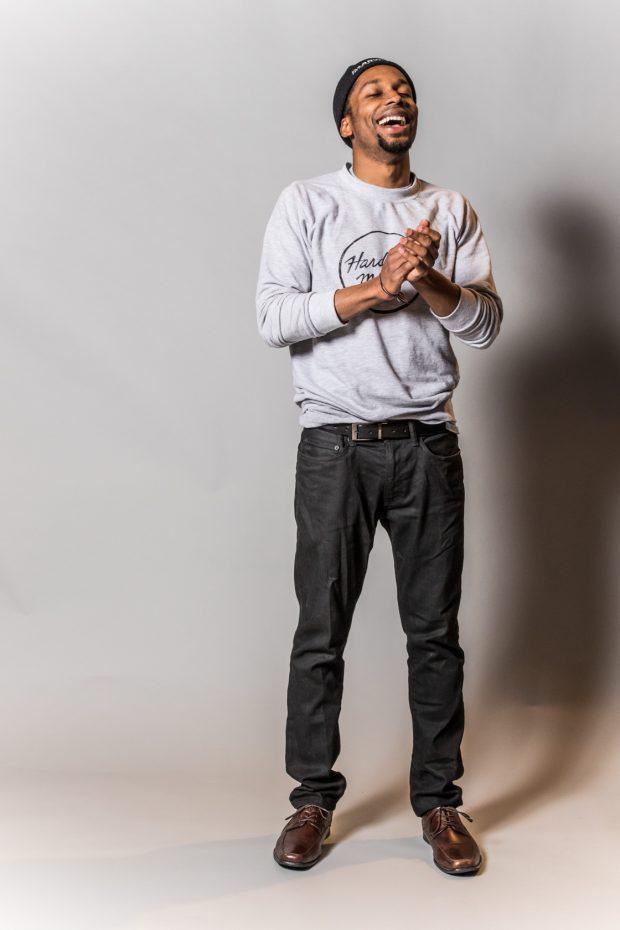
Hardwork Movement | photo by Josh Pelta-Heller for WXPN
TK: What year were you guys first on stage together at Hardwork Movement?
RB RICKS: That was 2012 or 2013. That was in Brooklyn. I think that was like Fall of 2012. The group was a little bit different than how it’s constructed now, but that was the first time that we ever made a formal push, where people outside of ourselves knew us as Hardwork Movement. We took a trip up to Brooklyn, it was the Trash Bar…
RICK BANKS: Rest in peace! No longer exists…
RB RICKS: …we went up there, it was me as DJ, Dwight [Duns] as MC, Kennan [Banks] as the MC, Keys wasn’t there yet, and we had one drummer, by the name of Charlie. And that was the very first show that we played as Hardwork Movement. That was a crazy show.
JEREMY KEYS: So that show…
TK: You were there, though?
JEREMY KEYS: I was there! Well, I was there eventually…
RB RICKS: He was there, but he missed half the show! [laughs]
JEREMY KEYS: Yeah, what happened was.. That was per yuze. I decided to park my car in Hoboken, thinking it was right next to Brooklyn, but I’m a dummy. So I ended up taking the train across New York, not knowing where I was going, and like rolled in right after a couple songs. And got on stage, right in the nick of time…
TK: So you pulled it off like you planned that…
JEREMY KEYS: Oh yeah. Totally planned, totally planned. Professional.
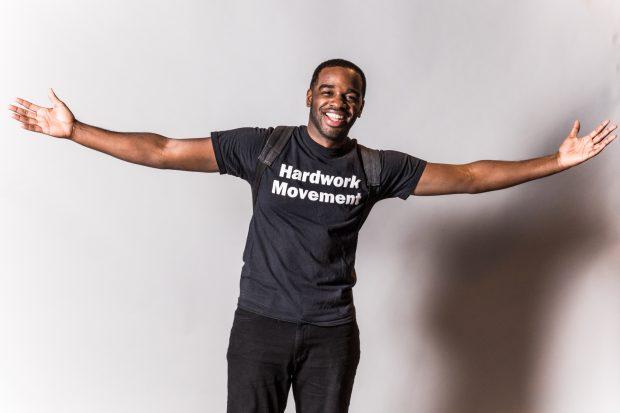
Hardwork Movement | photo by Josh Pelta-Heller for WXPN
TK: How did it happen that you guys played Brooklyn first, instead of Philly?
RB RICKS: Talk to our booking agent, Dwight [Duns]…
STERLING DUNS: I think we just sent some emails out, there was some website that basically wants to get you booked and paid, they know how to make people come through. So we just looked in Brooklyn, we had a lotta friends in New York, so we decided to pop up there. And we were in another band around the same time, and we had played with that band in Philly, and in New York.
TK: What band was that?
STERLING DUNS: It’s called Token Prospects, it was an indie-urban-folk band, it’s like a mixed-genre band where Keys sand and Rob [RB Ricks] played guitar. So we had played in Philly before with that band.
TK: I know you mentioned the stuff in high school, but how did you first start getting connected to other musicians and start playing more in Philly?
JEREMY KEYS: So back when we were doing the whole Token Prospects thing — me, Rob [RB Ricks] and Duns — our big thing was getting like open mics. So we used to actually always come to World Cafe Live for their open mics on Mondays, I believe. And we would go to other places like Fergie’s, that place on South Street, Lickety Split. So that’s when we really got a chance to connect with some other musicians, and actually a couple people we connected with we’re still in touch with. Like, our drummer in Hardwork Movement, Angel Ocana, is someone we met doing an open mic at World Cafe years ago. So that was really the first time we kinda tapped into the whole Philly music scene, and then I also have to give a shout-out to our man Scooter, at the Grape Room. Hardwork played multiple shows. Scooter always hooked us up with shows. Whenever there were showcases there, he made sure that we came through, so. That was a big opportunity for us.
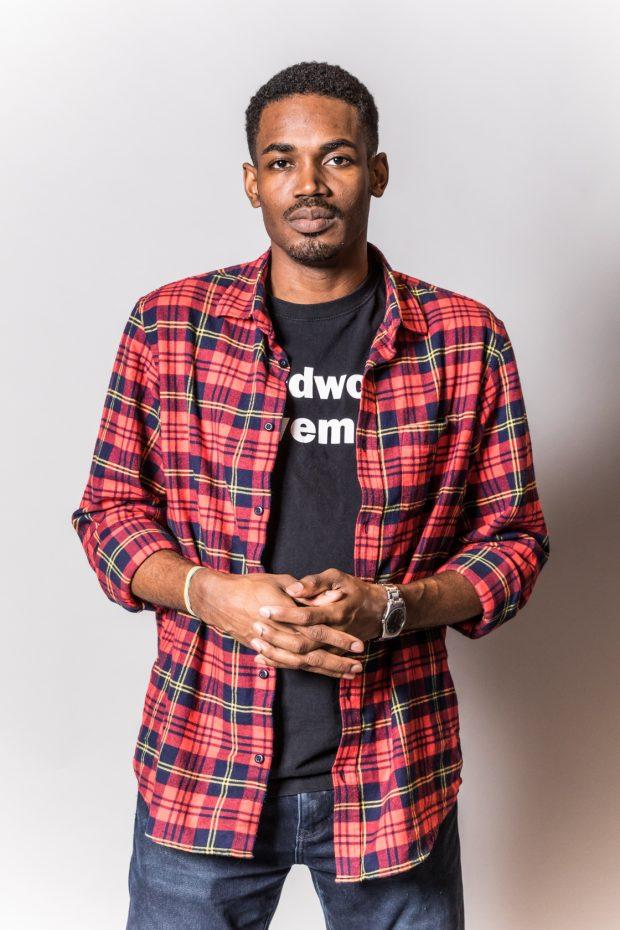
Hardwork Movement | photo by Josh Pelta-Heller for WXPN
TK: Philly can be a tough crowd. How did people first react to your shows?
RICK BANKS: We’ve been pretty blessed in the sense that we’ve been able to connect with so many groups of people, we’ve been able to draw from a lotta pockets of Philly, which has been pretty cool. I mean, definitely a strong West-Philly contingent in there — which is great, it’s where a large part of the band is based. We’ve just been fortunate enough to build and connect with people. I think some of that is, our music is just about trying to be as open and connect with as many different people as possible, so we’ve been able to feel some of that love from Philly.
STERLING DUNS: Just echoing. Some of us are trained musically — Keys plays instruments and Keenan [Rick Banks] plays instruments, and RB plays guitar and then takes singing lessons, and rappin’, really taking that on. And Philly is just the kinda city that just like, recognizes real. Like, real recognizes real! So we would put on these shows, we’d go to these open mics, and we would just leave it all out there, and people would give us honest feedback, you know?! And, you know they would really keep it real with us. And we would keep it real with each other, I think was another powerful thing, we would sharpen each other before we got on stage. So you know, they kept it real, and we’re enjoying it. And we would literally be in all pockets of like all kinds of different people — black, white, folk singers, jazz artists, hip hop artists at these open mics. And even sometimes when we didn’t curate our own shows, we’d meet all different kinds of people. So the audience would look diverse, and they’d be like ‘yo I don’t really listen to hip hop, but like yo, I vibe with that!,’ or like ‘yo I listen to hip hop, and like y’all sound a little different and I vibe with that!’ So it was just like, really, it helped us to find our own sound, by doing all these open mics, and booking these gigs. And also we were just getting constantly good feedback, which was awesome.
RB RICKS: So just kinda thinkin about playing Philly, like — some shows, there were times when we were playing in front of like, two people. Ten people. But, like Duns was kinda saying, you know, we left it all out there, and you know, little by little we started to kinda gain some traction within the city and kinda gain a following. And to align with what Duns said, that really kinda resonates: it’s Philly — you make it here, you can make it anywhere! It’s like legit. ‘Cause people be honest with you, you talk about Philadelphia sports fans, and [throwing snowballs at] Santa Claus, you know, it’s real! If you’re whack, people just be like ‘yo man, get outta my face man!’ [laughs] And there’s been times when we’ve had shows where, you know, they weren’t the best shows, and people let us know, man! ‘Yo man, y’all need to do some more rehearsin’!’ It’s a great city. You have to bring your A-game when you come to Philly and you come to perform, I mean, that’s just a little word to the wise: come correct, when you playin’ in Philly!
JEREMY KEYS: Just to kind of elaborate on that, yeah, it reminds me of the story of our first show last year at Kung Fu Necktie, just talkin’ about the diversity of the crowd. So we got connected with Chill Moody ‘cause I used to work at an ad agency, and we linked up with him for some campaign. So I hit him up, ‘cause we were having this album release show, like ‘yo come through, it’s gonna be awesome,’ and he was like alright. So we saw him after the show — first off, the show was crazy, it was the most diverse crowd I’ve ever seen. It was upstairs at Kung Fu Necktie — the capacity was 75 and there were like 100 people there (sorry Kung Fu Necktie)! People were like fighting to get in, like what is going on. And Chill Moody came up to me afterwards, he’s like ‘yo man, I knew you were in a band, but I didn’t think you guys were actually good! Like, this jawn’s crazy! I haven’t seen any of these people here… ever!’ [laughs] So that just kinda speaks to, you know, we kinda pride ourselves on uniting different groups of people, and you know, it’s been exciting to have them really support us, and really help push us forward.
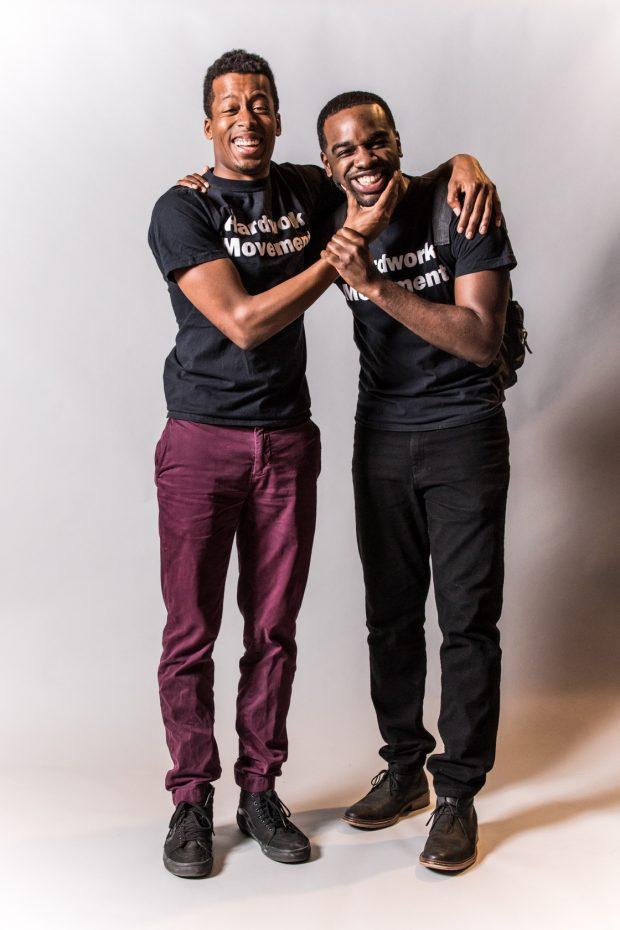
Hardwork Movement | photo by Josh Pelta-Heller for WXPN
TK: You guys have a favorite venue to play at in Philly?
KEYS: Oooh, good question. I like playing World Cafe. Playing Boot & Saddle has been really fun for us too. Yeah, kinda all over the place.
STERLING DUNS: I love Johnny Brenda’s, it’s a cool venue. When I moved back to Philly after going to school, it was the place where I first saw one of my first live concerts. And I love that you can project stuff on the screen, the sound was great, go downstairs, get me a little veggie sandwich, you know.. JB’s is one of my favorite venues, probably because it was one of my first memories of going to a concert.
RB RICKS: I guess mine would be a toss-up. I enjoy the Grape Room, just because there are so many memories there. We haven’t played there since we became Hardwork, but just like formative years there, like that’s definitely up there. The first time I felt like I was able to accomplish a lotta stuff, I had a lotta my “first moments” at Grape Room, so that’s a very special place for me. I DJ’d upstairs there. So like, that’s a special place for me. But now, I really like Johnny Brenda’s, I think Johnny Brenda’s is a nice spot for us. The sound is great, it’s in an awesome location. The balcony and the dynamics of it. It’s a cool spot. And then World Cafe, when we played there last year, that was dope too.
KEYS: I love Johnny Brenda’s. I just love that space, and it’s awesome for a group that’s on the rise. [laughs] It’s cool for artists of our size, just to manipulate a space. But I’m also gonna be different, just for the sake of being different: I love playing 222, which is our trumpet player’s house. We used to always play house parties at our trumpet player’s house, and it’s just like the best environment to just try new things, get direct feedback from people, just also have like a really good time playing music. It’s in West Philly, [North] 46th and Farragut.
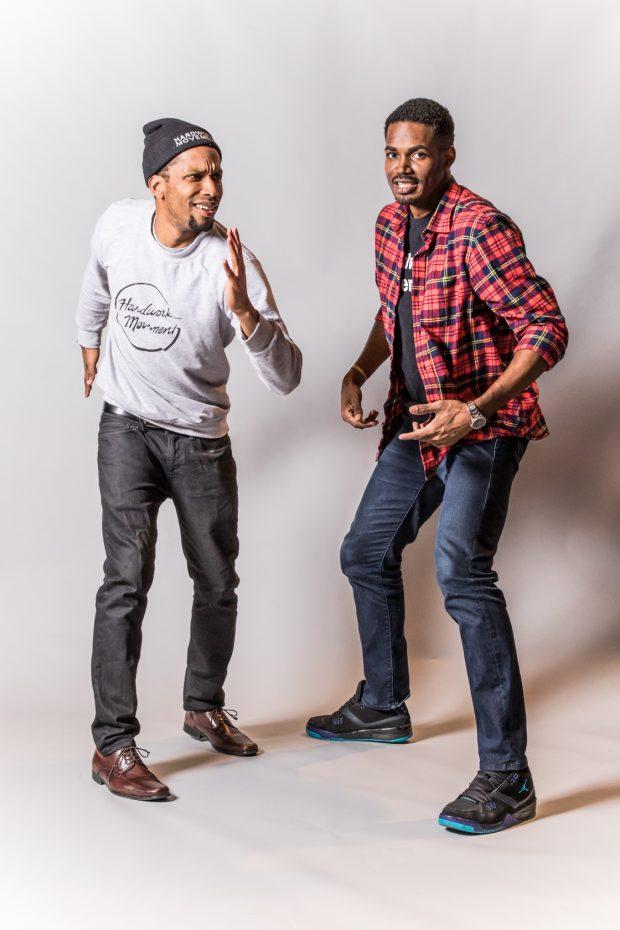
Hardwork Movement | photo by Josh Pelta-Heller for WXPN
TK: Who are your favorite Philly artists, or which Philly artists were mentors or influences for you?
RB RICKS: I like the sound of Rick Banks. He’s a legend! [laughs]
RICK BANKS: Philly International, number one. The whole Sound Of Philly, love that. Gamble and Huff just like defined an era, and that’s still one of my, like, overarching missions, is to bring that kind of focus and energy back to Philly, musically. I have to throw out The Roots. It’s sometimes an easy comparison — live hip hop bands — but they’re such a great blueprint for really grinding out of Philly, and then just seeing what they’ve become. Gotta throw some love to your Jill Scotts and Musiq Soulchilds. Philly’s been really great to have such a rich and deep scene. From the hip hop sense, it’s really formed us, it’s been great.
STERLING DUNS: Banks hit a lot of ‘em, but yeah I think The Roots — I think Black Thought is somebody who, when I think about being an MC, someone who both has a commitment to the craft and content, and you know who can rap over a whole range of kinds of tracks, draw you in, make you feel somethin’, make you feel like ‘ew, that was a dope bar!’ — all those things, for me as an MC, really think about the power of words, that’s been somebody I’ve been really grateful to look up to, and to share a connection to the city of Philadelphia with. But there’s such a rich scene here.
KEYS: Yeah I think the other two guys hit a lot of them I definitely got love for The Roots. Love me some Teddy Pendergrass! Love me some Teddy. My mom used to always play that when I was growin’ up. And I don’t know if it counts, but I gotta mention John Coltrane, since he lived here. Just when I think about working tirelessly at your craft, and pushing boundaries, he’s someone I always look to for inspiration.
RB RICKS: The Roots, that’s huge, especially when we think of dynamics, and the sound, and trying to being able to maneuver with the type of sounds that we’re workin’ with. I love Boyz II Men, they were huge, growin’ up in Philly. Motown Philly back again! That was big for me. I would say DJ Jazzy Jeff, Will Smith — those are two, when you think Philly, internationally. That was a big inspiration, just the amount of consistency those guys have had in their run. I would say Chill Moody, he’s looked out, just on a personal level, just to kind of show us the the ropes and really kinda give us some tools that he has, and give us some of his blessings, that was great. And then another would be a guy by the name of Curt Chambers. He’s a guitarist, he’s out in California now. I talk to him every once in awhile, he kinda gave me some advice, just as far as the musical aspects of things.
TK: What do you like the most about the Philly arts community as a whole, and what if anything do you find most frustrating about trying to be an artist in this city?
KEYS: I think what I love the most about the community is how welcoming it is. No matter what your vibe is — whether you’re The Districs, or Dr. Dog — no matter what you wanna do and how you wanna express yourself in the music scene, there’s always gonna be a place for you to do that. I think a lotta the venues try to look out big time for that, and try to curate those different vibes. And I think that strong community here really draws in bigger artists too who wanna be a part of it. But I think what’s most frustrating is that people kind of downplay Philly, people outside of the city. It’s kind of the place where, once you come here and experience it, you fall in love with it, but otherwise I think people are always looking at like New York or LA as like these big hubs for music, and don’t really realize that Philly also has that. So I think part of our mission is also to kind of change that perception a little bit, and just let people know that there’s an amazing music community here, and there’s tons of artists who we interact with all the time who are making amazing things.
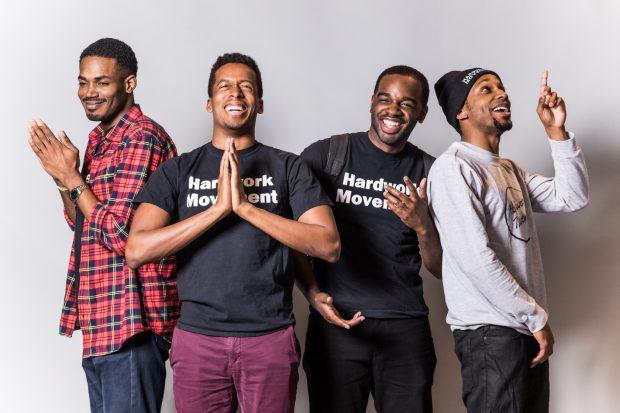
Hardwork Movement | photo by Josh Pelta-Heller for WXPN
TK: …Anybody else wanna add to that?
STERLING DUNS, RB RICKS & RICK BANKS: Dang. That’s pretty accurate. [laughs] That was on-point.. Amen!
RB RICKS: If I had to add somethin’, I would say diversity within Philly I think is great. You can go into any show — a lotta shows that we play at or just anywhere — and you’ll see a totally different class of people. And you never know who’s who in Philly, which is also great. We talked about it being downplayed, but there’s a lotta people that live in Philly that do so many different things, either remotely or just are big influences across the globe. And one of the pros of playing in Philly is that you never know who you’re gonna play in front of. You never know whose ears are gonna listen to your music.
TK: How have you guys seen the city change in Philly?
RICK BANKS: How much time you got? [laughs] Just watching neighborhoods shift, to me has been fascinating. Like from the areas of West Philly — I’m originally from like 59th and Arch — and watching how West Philly has changed so much has been crazy. Or how North Philly has changed — I live in Fairmount now, and I look at my neighborhood now, vs. what it was ten, fifteen years ago. It’s entirely different. It’s fascinating seeing Philly just like take off its training wheels, finally. [laughs] It seemed like once we decided to build something tall, everything else kinda came along with that. So that’s been really cool for me.
RB RICKS: On the music scene, it’s kinda good to see some of the bigger artists or acts kinda reach on back in, kinda bring Philly up. Looking at Made In America. I think that’s great. That’s something that I’ve noticed, anyway. I haven’t noticed anything like that prior, but I think it’s also good to kinda see some major events going on in Philly that can kinda help curate and can hone some of these up-and-coming artists’ skills. So I think that’s cool too.
KEYS: I think Philly’s almost kind of gone through this renaissance, too. I mean you have a lot of younger people moving here, and it’s really pushing forward innovation in the arts, with music, or with visual arts, street art, murals, but also like with start-ups and a lot of companies. I think it’s cool to see this youthful energy within the city, and Philly kind of creating this new history for itself. You know, people who are outside of the city always think about the Constitution, and Olde City and all these things, but I think Philly isn’t depending on that anymore, and we’re kinda forming this new history, through all the people that are doing these amazing things here.
TK: Last one: PBC or Yards?
STERLING DUNS, KEYS & RICK BANKS: Ohhhh… I’m partial to Brawler. Love stout is my jam! What you got, Bobby?
RB RICKS: I’ll leave that one to the group. I’m more of like a Jack and honey kinda dude, know what I’m sayin’? Keep it brown! [laughs]
- Hardwork Movement | photo by Josh Pelta-Heller for WXPN
- Hardwork Movement | photo by Josh Pelta-Heller for WXPN
- Hardwork Movement | photo by Josh Pelta-Heller for WXPN
- Hardwork Movement | photo by Josh Pelta-Heller for WXPN
- Hardwork Movement | photo by Josh Pelta-Heller for WXPN
- Hardwork Movement | photo by Josh Pelta-Heller for WXPN
- Hardwork Movement | photo by Josh Pelta-Heller for WXPN
- Hardwork Movement | photo by Josh Pelta-Heller for WXPN
- Hardwork Movement | photo by Josh Pelta-Heller for WXPN
- Hardwork Movement | photo by Josh Pelta-Heller for WXPN
- Hardwork Movement | photo by Josh Pelta-Heller for WXPN
- Hardwork Movement | photo by Josh Pelta-Heller for WXPN
- Hardwork Movement | photo by Josh Pelta-Heller for WXPN
- Hardwork Movement | photo by Josh Pelta-Heller for WXPN
- Hardwork Movement | photo by Josh Pelta-Heller for WXPN
- Hardwork Movement | photo by Josh Pelta-Heller for WXPN
- Hardwork Movement | photo by Josh Pelta-Heller for WXPN
- Hardwork Movement | photo by Josh Pelta-Heller for WXPN
- Hardwork Movement | photo by Josh Pelta-Heller for WXPN
- Hardwork Movement | photo by Josh Pelta-Heller for WXPN
- Hardwork Movement | photo by Josh Pelta-Heller for WXPN
- Hardwork Movement | photo by Josh Pelta-Heller for WXPN
- Hardwork Movement | photo by Josh Pelta-Heller for WXPN
- Hardwork Movement | photo by Josh Pelta-Heller for WXPN
- Hardwork Movement | photo by Josh Pelta-Heller for WXPN
- Hardwork Movement | photo by Josh Pelta-Heller for WXPN
- Hardwork Movement | photo by Josh Pelta-Heller for WXPN
- Hardwork Movement | photo by Josh Pelta-Heller for WXPN
- Hardwork Movement | photo by Josh Pelta-Heller for WXPN
- Hardwork Movement | photo by Josh Pelta-Heller for WXPN
- Hardwork Movement | photo by Josh Pelta-Heller for WXPN
- Hardwork Movement | photo by Josh Pelta-Heller for WXPN
- Hardwork Movement | photo by Josh Pelta-Heller for WXPN
- Hardwork Movement | photo by Josh Pelta-Heller for WXPN
- Hardwork Movement | photo by Josh Pelta-Heller for WXPN
- Hardwork Movement | photo by Josh Pelta-Heller for WXPN
- Hardwork Movement | photo by Josh Pelta-Heller for WXPN
- Hardwork Movement | photo by Josh Pelta-Heller for WXPN
- Hardwork Movement | photo by Josh Pelta-Heller for WXPN
- Hardwork Movement | photo by Josh Pelta-Heller for WXPN
- Hardwork Movement | photo by Josh Pelta-Heller for WXPN
- Hardwork Movement | photo by Josh Pelta-Heller for WXPN
- Hardwork Movement | photo by Josh Pelta-Heller for WXPN
- Hardwork Movement | photo by Josh Pelta-Heller for WXPN
- Hardwork Movement | photo by Josh Pelta-Heller for WXPN
- Hardwork Movement | photo by Josh Pelta-Heller for WXPN
- Hardwork Movement | photo by Josh Pelta-Heller for WXPN
- Hardwork Movement | photo by Josh Pelta-Heller for WXPN
- Hardwork Movement | photo by Josh Pelta-Heller for WXPN
- Hardwork Movement | photo by Josh Pelta-Heller for WXPN

















































